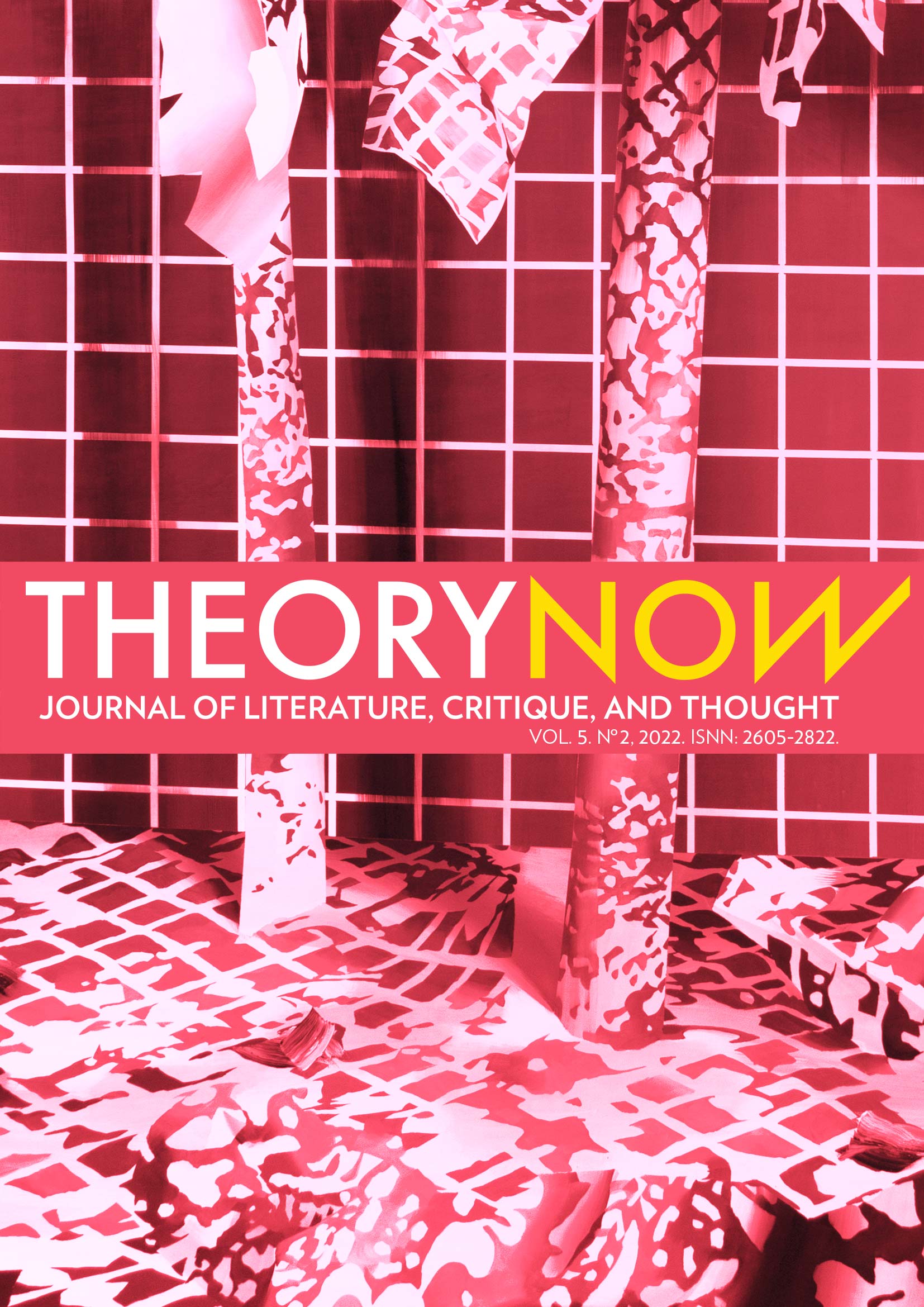Some Aspects of Terry Eagleton’s Use of Freudian Psychoanalysis
DOI :
https://doi.org/10.30827/tn.v5i2.24463Mots-clés :
Terry Eagleton, Sigmund Freud, Karl Marx, Work, Love, ReasonRésumé
This paper looks at Terry Eagleton’s engagement with Freudian psychoanalysis. We start by looking at Eagleton’s increasing interest in psychoanalysis in the late 1970s, particularly in “Marx, Freud and Morality” (1977). We then move on to three crucial topics that Eagleton tackles by resorting to psychoanalysis: work, love and reason. In each of these three cases we present the ways in which Eagleton posits psychoanalysis as a plausible complement to Marxism, even where their compatibility is not immediately evident. Our reading is intended to be descriptive; however, it does not shy away from pointing out the inconsistencies that we have found in Eagleton’s use and assessment of psychoanalysis. In the case of work, we address the relevance of Freud’s view of it as inherently unpleasant in connection with the Marxian concept of alienated labour. Regarding love, we discuss Eagleton’s focus on love understood as agape rather than on the Freudian conception of love as eros. As far as reason is concerned, we deal with Freud’s faith in the intellect and in science as the sole safeguards of humankind against the assaults of the superego.
Téléchargements
Références
Alderson, David. Terry Eagleton. Basingstoke: Palgrave Macmillan, 2004.
Dolar, Mladen. A Voice and Nothing More. Cambridge, MA, The MIT Press, 2006.
Eagleton, Terry. “Marx, Freud and Morality”. New Blackfriars, vol. 50, no. 680, 1977, pp. 21-29.
____. The Rape of Clarissa: Writing, Sexuality and Class Struggle in Samuel Richardson. Minneapolis, MN, University of Minnesota Press, 1982.
____. Literary Theory: An Introduction. Minneapolis, MN, University of Minnesota Press, 1983.
____. “Introduction”. Ideology, Terry Eagleton (ed.), London, Longman, 1994, pp. 1-20.
____. The Ideology of the Aesthetic. 1990. Oxford, Blackwell, 1992.
____. Heathcliff and the Great Hunger. London, Verso, 1995.
____. Sweet Violence: The Idea of the Tragic. Oxford, Blackwell, 2003.
____. “Introduction to the Second Edition (1987)”. Myths of Power: A Marxist Study of the Brontës. 1975. Basingstoke, Palgrave Macmillan, 2004, pp. xxi-xxix.
____. Holy Terror. Oxford: Oxford University Press, 2005.
____. Criticism and Ideology: A Study in Marxist Literary Theory. 1976. London, Verso, 2006.
____. The Meaning of Life: A Very Short Introduction. Oxford, Oxford University Press, 2007.
____. “El sentido de la vida”. La condició humana: Debat al CCCB, 4 February 2008, Centre de Cultura Contemporània de Barcelona, Barcelona, 2008.
____. The Trouble with Strangers: A Study of Ethics, Oxford, Wiley-Blackwell, 2009.
____. On Evil. New Haven, CT: Yale University Press, 2010.
____. Humour, New Haven, CT, Yale University Press, 2019.
Freud, Sigmund. “On Narcissism: An Introduction.” The Standard Edition of the Complete Psychological Works of Sigmund Freud, Vol XIV (1914-1916). Edited and translated by James Strachey. London, The Hogarth Press and the Institute of Psycho-Analysis, 1957, pp. 73-102.
____. The Future of an Illusion. The Standard Edition of the Complete Psychological Works of Sigmund Freud, Vol XXI (1927-1931). Edited and translated by James Strachey. London, The Hogarth Press and the Institute of Psycho-Analysis, 1961a, pp. 1-56.
____. Civilization and Its Discontents. The Standard Edition of the Complete Psychological Works of Sigmund Freud, Vol XXI (1927-1931). Edited and translated by James Strachey. London, The Hogarth Press and the Institute of Psycho-Analysis, 1961b, pp. 57-145.
____. “The Dissection of the Psychical Personality”. The Standard Edition of the Complete Psychological Works of Sigmund Freud, Vol XXII (1932-1936). Edited and translated by James Strachey. London, The Hogarth Press and the Institute of Psycho-Analysis, 1964a, pp. 57-80.
____. “The Question of a Weltanschauung”. The Standard Edition of the Complete Psychological Works of Sigmund Freud, Vol XXII (1932-1936). Edited and translated by James Strachey. London, The Hogarth Press and the Institute of Psycho-Analysis, 1964b, pp. 158-182.
Holy Bible, Grand Rapids, MI, The Zondervan Corporation, 1962.
Lacan, Jacques. The Seminar of Jacques Lacan, Book XI: The Four Fundamental Concepts of Psychanalysis, Jacques-Alain Miller (ed.). Translated by Alan Sheridan. New York, Norton, 1981.
____. The Seminar of Jacques Lacan, Book VII: The Ethics of Psychoanalysis, Jacques-Alain Miller (ed.). Translated by Denis Porter. New York, Norton, 1992.
____. “Kant with Sade.” Écrits. Bruce Fink (ed.), New York, Norton, 2006.
Lukács, Georg. History and Class Consciousness. London, Merlin Press, 1990.
Marx, Karl. Economic and Philosophic Manuscripts of 1844. New York, International Publishers, 1964.
Marx, Karl. Grundrisse. Foundations of the Critique of Political Economy. Harmondsworth, Penguin Books and New Left Books, 1973.
Marx, Karl and Friedrich Engels. The German Ideology. Amherst, NY, Prometheus, 1998.
Phillips, Adam. “Freud’s Helplessness.” The Joys of Secularism: 11 Essays for How We Live Now, George Levine (ed.), Princeton, NJ: Princeton University Press, 2011, pp. 115-133.
Smith, Paul. Discerning the Subject. Minneapolis, MN, University of Minnesota Press, 1988.
Žižek, Slavoj. The Indivisible Remainder: On Schelling and Related Matters, London, Verso, 1996.
Téléchargements
Publié-e
Comment citer
Numéro
Rubrique
Licence
Theory Now Journal of Literature, Critique, and Thought est une publication d’accès ouvert, immédiat et totalement gratuit pour les lecteurs autant que les auteurs. Les auteurs ne payent aucun frais pour le processus éditorial de leurs articles. Nous permettons la lecture, le téléchargement, la copie, la distribution, l’impression, la recherche, le lien ou la réutilisation de tous les travaux publiés à des fins non commerciales, à condition que l’auteur, la revue et l’entité éditoriale soient cités. La diffusion des articles dans les réseaux sociaux (Facebook, Twitter, LinkedIn, etc.) et scientifiques (ResearchGate, Academia.edu, etc.), les dépôts institutionnels universitaires et autres dépôts publics, blogs et web personnels ou institutionnels, Google Scholar, ORCID, ResearchID, ScopusID, etc., est vivement recommandée. Dans tous les cas, la propriété intellectuelle des articles et les possibles droits économiques dérivés d’eux sont conservés exclusivement par leurs auteurs.













